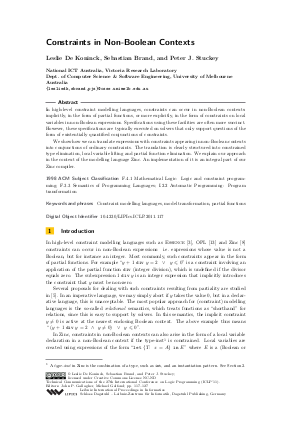Constraints in Non-Boolean Contexts
Authors Leslie De Koninck, Sebastian Brand, Peter J. Stuckey
-
Part of:
Volume:
Technical Communications of the 27th International Conference on Logic Programming (ICLP'11) (ICLP 2011)
Part of: Series: Leibniz International Proceedings in Informatics (LIPIcs)
Part of: Conference: International Conference on Logic Programming (ICLP) - License:
 Creative Commons Attribution-NonCommercial-NoDerivs 3.0 Unported license
Creative Commons Attribution-NonCommercial-NoDerivs 3.0 Unported license
- Publication Date: 2011-06-27
File

PDF
LIPIcs.ICLP.2011.117.pdf
- Filesize: 486 kB
- 11 pages
Document Identifiers
Subject Classification
Keywords
- Constraint modelling languages
- model transformation
- partial functions
Metrics
- Access Statistics
-
Total Accesses (updated on a weekly basis)
0Document
0Metadata
Abstract
In high-level constraint modelling languages, constraints can occur in non-Boolean contexts: implicitly, in the form of partial functions, or more explicitly, in the form of constraints on local variables in non-Boolean expressions. Specifications using these facilities are often more succinct. However, these specifications are typically executed on solvers that only support questions of the form of existentially quantified conjunctions of constraints. We show how we can translate expressions with constraints appearing in non-Boolean contexts into conjunctions of ordinary constraints. The translation is clearly structured into constrained type elimination, local variable lifting and partial function elimination. We explain our approach in the context of the modelling language Zinc. An implementation of it is an integral part of our Zinc compiler.
Cite As Get BibTex
Leslie De Koninck, Sebastian Brand, and Peter J. Stuckey. Constraints in Non-Boolean Contexts. In Technical Communications of the 27th International Conference on Logic Programming (ICLP'11). Leibniz International Proceedings in Informatics (LIPIcs), Volume 11, pp. 117-127, Schloss Dagstuhl – Leibniz-Zentrum für Informatik (2011)
https://doi.org/10.4230/LIPIcs.ICLP.2011.117
BibTex
@InProceedings{dekoninck_et_al:LIPIcs.ICLP.2011.117,
author = {De Koninck, Leslie and Brand, Sebastian and Stuckey, Peter J.},
title = {{Constraints in Non-Boolean Contexts}},
booktitle = {Technical Communications of the 27th International Conference on Logic Programming (ICLP'11)},
pages = {117--127},
series = {Leibniz International Proceedings in Informatics (LIPIcs)},
ISBN = {978-3-939897-31-6},
ISSN = {1868-8969},
year = {2011},
volume = {11},
editor = {Gallagher, John P. and Gelfond, Michael},
publisher = {Schloss Dagstuhl -- Leibniz-Zentrum f{\"u}r Informatik},
address = {Dagstuhl, Germany},
URL = {https://drops.dagstuhl.de/entities/document/10.4230/LIPIcs.ICLP.2011.117},
URN = {urn:nbn:de:0030-drops-31685},
doi = {10.4230/LIPIcs.ICLP.2011.117},
annote = {Keywords: Constraint modelling languages, model transformation, partial functions}
}
